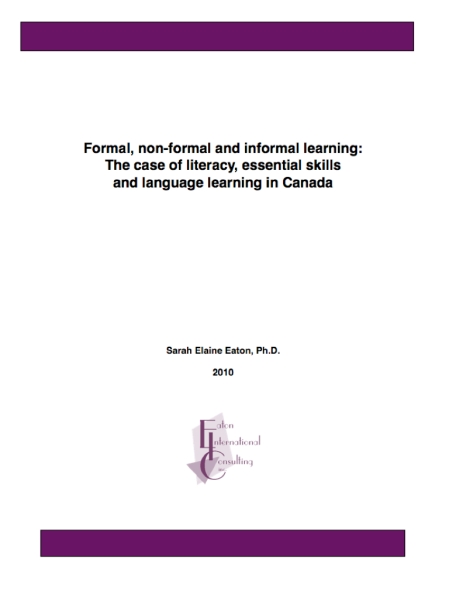This new research report is freely available in e-format (.pdf).
Executive Summary
This research report investigates the links between formal, non-formal and informal learning and the differences between them. In particular, the report aims to link these notions of learning to literacy and essential skills, as well as the learning of second and other languages in Canada.
Philosophical underpinnings of this research are:
- There is value in learning of all kinds.
- Learning is a lifelong endeavour.
- An interdisciplinary approach is valuable.
Notions of formal, non-formal and informal learning may be briefly outlined as:
Formal learning – This type of learning is intentional, organized and structured. Formal learning opportunities are usually arranged by institutions. Often this type of learning is guided by a curriculum or other type of formal program.
Non-formal learning – This type of learning may or may not be intentional or arranged by an institution, but is usually organized in some way, even if it is loosely organized. There are no formal credits granted in non-formal learning situations.
Informal learning – This type of learning is never organized. Rather than being guided by a rigid curriculum, it is often thought of experiential and spontaneous.
– (Organisation for Economic Co-operation and Development / Organisation de Coopération et de Développement Economiques (OECD), n.d.; Werquin, 2007)
Examples are given for literacy and essential skills, as well as second and other languages for each of the categories mentioned above.
Finally, the examples of systems developed value different types of learning using asset-based approaches are given. The tools developed by Human Resources and Skills Development Canada are explored for the case of literacy. The Common European Framework of Reference for Languages developed by the Council of Europe is considered for second and other languages.
Copies of the report may be accessed through:
National Adult Literacy Database (Canada)
http://library.nald.ca/research/item/8549
or
European Association of Education for Adults (Helsinki, Finland)
http://www.eaea.org/news.php?aid=17397&k=2088&%20d=2010-02
or
National Library of Canada – Online Archives Collection (Canada)
or
The Encyclopedia of Informal Education
http://www.infed.org/archives/e-texts/eaton_formal_nonformal_informal_learning.htm
or
http://globalliteracy.org/Eaton
or
Centre for Adult English Language Acquisition (CAELA) (United States)
http://www.cal.org/CALWebDB/ESLResourceDB/ (Resource #0274)
New! August, 2010 – Check out the companion report: Formal, Non-Formal and Informal Learning in the Sciences.
Related posts:
Formal, non-formal and informal education: What Are the Differences?
Formal, Non-formal and Informal Learning (Infographic) https://wp.me/pNAh3-266
Formal, Non-formal and Informal Learning: A podcast
Formal, Non-formal and Informal Learning in the Sciences
The many faces of non-formal learning
____________
If you found this post helpful, please click “Like” below and share it with others.
Here’s a link for sharing:
Formal, non-formal and informal learning: The case of literacy and language learning in Canada http://wp.me/pNAh3-C
Update – January 2018 – This blog has had over 1.8 million views thanks to readers like you. If you enjoyed this post, please “like” it or share it on social media. Thanks!
Sarah Elaine Eaton is a faculty member in the Werklund School of Education, University of Calgary, Canada.



The flow was quit good. Maybe add on emerging curriculum. Smart
Dr. Sarah Elaine Eaton
Very good your elaborated the Formal, Informal and non formal education. I tried to download your report, but not succeeded. could you please share it with me on my email ID
naseem_tareen005@yahoo.com
with warm regards
Naseem tareen Quetta Pakistan
Wuptiga Isaac Jatuat
This research is educative and explains in detail, the differences of
the types of education available globally and their values.
Thank you for your kind words. I appreciate your comment.
[…] be about the methods used, but simply the amount of hours spent learning. Learning can be done in formal, non-formal and informal contexts. Language learning doesn’t always take place in the classroom. Trained teachers can offer […]
Always try to bring up stories in your class involving english speaking words that your learners need to use in their everday communication
Hi, I`m from La Paz in Mexico, I feel excited to talk to you. I am a teacher and recently I got a new job. The reason I talk to you is because I usually teach grammar in my English classes instead of teaching how to speak -you know why? because I don`t know how to do that-
I just down load one of the books you recomend us to read, I whish I find the way to teach my children without grammar at the begining.
my students are between 5 and 8 years old, I teach them one hour a day.
Best regards and thanks to share all you know with us.
Well put together Sarah. Without diminishing the import of formal education, it is the informal learning within formal institutions that is representative of the values of the people in the institution. The degree and quality of mutual respect, collaboration, work ethic etc. all emerge independent of a formal curriculum … and are therefore important aspects are all types of learning. It gives us a look at the “how” while doing the “what.”
This is a quick and informative read. I am intrigued by the more proactive approach to learning being adopted in Europe. It’s important to recognize all of the things that individuals achieve, not just the shortcomings.
Is your title really supposed to be the clase? I haven’t finished reading the report so don’t know if it’s a word play between case and class?
Thanks, Tammy. I corrected the post title.